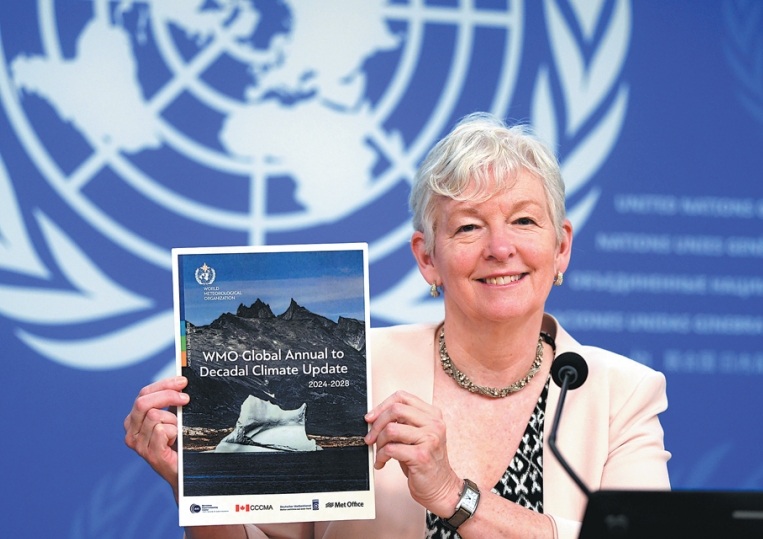Biden's tariffs hinder climate goals: Experts
Protectionist measures raise prices for consumers, stall green energy transition
By LIA ZHU in San Francisco | China Daily | Updated: 2024-06-07 10:11

The recent tariff hikes of US President Joe Biden's administration on Chinese imports, particularly on clean energy products, have drawn criticism for potentially slowing the United States' green transition and undermining its climate goals.
The Office of the US Trade Representative announced steep tariff hikes last month on a wide range of Chinese goods, including key components for clean energy technologies.
Experts warn that these tariffs will likely make clean energy products more expensive for US consumers and businesses, potentially slowing down the transition to renewable energy sources.
"The US doesn't have the domestic capacity to scale up production on clean energy products at a price that is attractive to consumers and businesses," Kyle Handley, an associate professor of economics and director of the Center for Commerce and Diplomacy at the University of California, San Diego, said.
As climate change has taken a heavy toll on the planet, United Nations Secretary-General Antonio Guterres has called for the tripling of the use of renewable energy by 2030.
Guterres said on Wednesday that global emissions of carbon dioxide must fall 9 percent each year to 2030 for the 1.5-degree target under the Paris climate accords to be kept alive.
"We need an exit ramp off the highway to climate hell," he said.
Handley said: "Chinese clean energy goods could have played a key role in the green transition for the US. (But) that is now more cost-prohibitive and likely to slow down the adoption of clean energy technology and products."
In response to the ambiguity of the new policy, Handley has created the Biden Tariff Analyzer app. This tool allows users to identify the top global suppliers for products affected by the tariffs, enhancing their comprehension of potential price hikes.
He highlighted two prominent examples of how the tariffs would affect clean energy technologies. One is the batteries that power electric vehicles, and the other is solar cells.
"Even if the EVs are assembled in the US, the final vehicle will be more expensive. This is especially severe with EVs because the batteries make up a large share of the total cost of the car," he explained.
"The new tariffs on solar cells are similar. Even if the solar cells are assembled into panels or other arrays in the US, the final cost of the product will be higher. If you raise the price of solar power, fewer people will install solar on the roof, for example."
The White House said the tariff rate on lithium-ion EV batteries will increase from 7.5 percent to 25 percent this year, while that on lithiumion non-EV batteries will undergo a similar increase, but not until 2026.Additionally, the tariff rate on battery parts will increase from 7.5 percent to 25 percent this year.
Based on the calculations on Handley's app, China was the top supplier of lithium-ion batteries to the US last year, contributing 71.7 percent of the latter's annual imports. The second-largest supplier was South Korea, taking up only 10 percent of the US market.
The case is the same with lithiumion batteries used for EVs. The app shows Chinese-made products accounted for 65.1 percent of US imports last year, far surpassing Poland's 18.3 percent at the second.
Adding to the challenges that businesses face is the ambiguity of the initial tariff announcement, Handley said.
"The specifics matter," he said, stressing that there are more than 10,000 different tariff lines in the US.
Even broad terms such as EVs can be ambiguous, "because there are different tariffs based on the passenger capacity and whether the car is a hybrid, plug-in hybrid or fully electric", he said. "If you are managing a company with a complex supply chain, researching and adjusting to these changes is costly," he said, adding that he hopes his app can streamline information gathering for businesses affected by the new tariffs.
Contradicting priorities
Politicians have also weighed in, criticizing the tariffs for contradicting the Biden administration's climate priorities.
Colorado Governor Jared Polis said on X that the tariffs are "horrible news for American consumers and a major setback for clean energy".
A Bloomberg editorial published on May 28 criticized the policy for blocking access to affordable clean technology and undermining efforts to fight climate change.
While proponents of the tariffs argue they could benefit US clean energy producers in the long run by giving them time to carve a niche in the global market for EVs and clean-power technologies, the editorial countered that such protectionism will inflate labor costs, making US producers less competitive and hindering innovation.
Research by public policy research organization Cato Institute in Washington supports this view. A study by economist Erica York in April found that US tariffs imposed in 2018 and 2019 by former president Donald Trump were almost entirely passed on to US consumers, resulting in higher prices and reduced export growth.
She argued that tariffs generally harm consumers and the overall economy, rarely achieving their intended benefits.
"They (tariffs) serve not the strategic interests of the nation, but the parochial interests of politicians who get to enrich preferred companies and workers by imposing diffuse and mostly hidden costs on the rest of the US economy," she said in the study.
Agencies contributed to this story.
liazhu@chinadailyusa.com
























